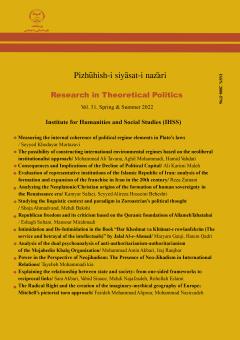An analysis of the benefit-basic approach of liberal Institutional to the international environmental regime
Subject Areas : پژوهش سیاست نظری
mohamad ali tavana
1
![]() ,
Aghil Mohammadi
2
,
hamid vahadi
3
,
Aghil Mohammadi
2
,
hamid vahadi
3
1 - Associate Professor, Department of Political Science, Shiraz University, Iran.
2 - Assistant Professor, Public and International Law Department, Shiraz University, Iran.
3 - M.A in International Relations, Yazd University, Iran.
Keywords: Global governance, environment, common interests, international regimes,
Abstract :
Theoretically, there are three approaches to international environmental regimes: an approach of benefitsic liberal Institutionalism, the knowledge-based constructivism, and the power of realism. This article tries to analyze the implications of the liberal-mindedness non-ideological axis approach for international environmental regimes. The findings of this paper show: In an approach to the benefits of liberal Institutional, international environmental regimes are built on the basis of two variables of international institutions and environmental interests. Institutional co-operation is directed at covering global governance and environmental commonalities based on rational choice. This approach also shows that the cooperation of international bodies for the management of global environmental issues, which have strong rational justifications, not only regulates the international anarchy, but also reduces environmental costs. This article uses the methodology of thematic knowledge.
